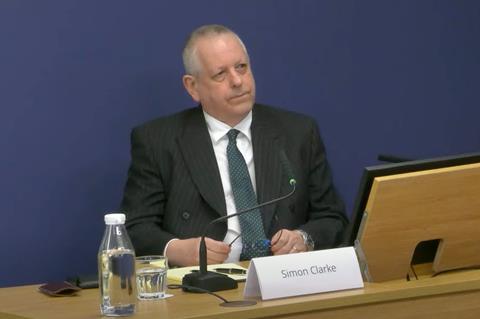A barrister who continued to work with the Post Office even as the Horizon scandal escalated has said he could not abandon his client.
Giving evidence to the public inquiry yesterday, Simon Clarke described his shock at learning in 2013 that an expert witness had misled the court and that a Post Office security chief had suggested that minutes of meetings be ‘shredded’.
Asked why he and his firm Cartwright King did not simply stop working for the Post Office in the face of such issues, he said: ‘I am just a bit old-fashioned about this. Barristers don’t walk away from their clients when life gets difficult. I saw my role as their barrister through Cartwright King who gave palatable and unpalatable advice. It is trite but [I stayed] in the hope I could do some good for them.’
Clarke authored two pieces of advice during 2013 on the shredding instruction and the reliability of Gareth Jenkins, the Fujitsu expert witness whose evidence had been crucial to several prosecutions of sub-postmasters.
Edward Henry KC, a representative of some affected sub-postmasters, said these advices were ‘extremely accommodating’ for the Post Office and amounted to Cartwright King effectively saying ‘we will throw ourselves under the bus for you’. Clarke rejected this analysis and said there was no pressure placed on him to cover for the Post Office.
Clarke said he flagged up to Post Office solicitor Rodric Williams that Jenkins’ evidence was unreliable and that he may have misled the court by not disclosing the presence of bugs.
The barrister said he expected shock and horror at this revelation, but Williams appeared to ‘take the information in his stride’. ‘All I can say is I did not see [from Williams] the surprise and astonishment I expected,’ added Clarke.

But while Clarke did establish Jenkins' unreliability through a secretly recorded conversation, he was criticised by counsel for not taking information to the court, particularly in the case of Seema Misra, who had been convicted in 2010 based on the expert’s oral evidence in court.
Clarke made the point that he was not a prosecuting barrister for the Post Office but instead was the barrister who stopped the prosecutions. He added: ‘My function as a barrister in front of the court is not to mislead the court. There is no circumstance in the Post Office saga in which I had misled a court - therefore I had no duty to go back to the court.’
Clarke also sought to clarify the reason for making a public interest immunity application at Birmingham Crown Court on the eve of a trial. This secured an eight-week adjournment and an agreement from His Honour Judge Chambers that the existence of a critical report into the Post Office should not be disclosed to defence solicitors.
He explained there was nothing improper about the application and it was made because Cartwright King was concerned that disclosing the report might have been a breach of parliamentary privilege, as it was due to be shown to MPs that week.
’It is common practice amongst counsel that if a PII application is to be made the defending counsel will be informed informally at court by prosecuting counsel and that is what I did,’ he added.
The inquiry continues.






























